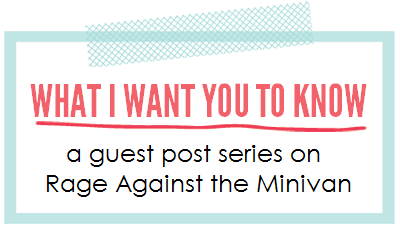What I Want You to Know is a series of reader submissions. It is an attempt to allow people to tell their personal stories, in the hopes of bringing greater compassion to the unique issues each of us face. If you would like to submit a story to this series, click here. Today’s guest post is by Wendy.
Sometimes the hardest part is seeing him so miserable and not being able to help. Nothing I do caused this, and nothing I do can make it better.
Sometimes the hardest part is having to always do the damn dishes myself, because he went to bed immediately after dinner, yet again.
Sometimes I torture myself with thoughts of an acquaintance of ours—a friendly, adventurous, loving family man who committed suicide.
Sometimes, when he covers his ears in pain at our children’s voices, I am not sure who I am sadder for, him or them.
Sometimes his brokenness makes me feel strong. I can get dinner on the table and keep us in clean clothes, function at work, help kids with homework and bedtime, remember to pay the bills, and do it all without whining and bitching. He is not a “third child” as some women snidely refer to their husbands. I know this man, and I know how much he does for us even with the black cloud pressing down. I know how much he would be doing if he were himself. He is doing the best he can, and I can pick up the rest.
But sometimes I don’t want to. I want to be able to go to my nephew’s house after Christmas dinner while he stays home to put the kids to bed. I want someone else to fold the laundry. I want him to take the kids to the park and play, really PLAY with them like he used to (and I’m too lazy to—Mama doesn’t like to run).
Today he called me from work, where he was paralyzed between panic and misery. He had already scheduled a doctor’s appointment for tomorrow, and I arranged for his mom to watch the kids so I can accompany him. It’s the first time he’s made his own appointment—ever since he confessed he doesn’t feel like he deserves to feel better, I make sure to schedule them and get his prescriptions refilled. Does this mean he’s doing well and taking charge of his help, or does it mean he’s so far down he scared himself? I fear the latter. I hope the doctor can help.
I don’t resent my husband at all. Illness is illness, not a personal lapse. I don’t even mind having to the dishes, not really. I do, however, deeply resent the depression. It is hurting someone I love. It’s affecting my kids. I want it to go away.
Sometimes the hardest part is seeing him so miserable and not being able to help. Nothing I do caused this, and nothing I do can make it better.
Sometimes the hardest part is having to always do the damn dishes myself, because he went to bed immediately after dinner, yet again.
Sometimes I torture myself with thoughts of an acquaintance of ours—a friendly, adventurous, loving family man who committed suicide.
Sometimes, when he covers his ears in pain at our children’s voices, I am not sure who I am sadder for, him or them.
Sometimes his brokenness makes me feel strong. I can get dinner on the table and keep us in clean clothes, function at work, help kids with homework and bedtime, remember to pay the bills, and do it all without whining and bitching. He is not a “third child” as some women snidely refer to their husbands. I know this man, and I know how much he does for us even with the black cloud pressing down. I know how much he would be doing if he were himself. He is doing the best he can, and I can pick up the rest.
But sometimes I don’t want to. I want to be able to go to my nephew’s house after Christmas dinner while he stays home to put the kids to bed. I want someone else to fold the laundry. I want him to take the kids to the park and play, really PLAY with them like he used to (and I’m too lazy to—Mama doesn’t like to run).
Today he called me from work, where he was paralyzed between panic and misery. He had already scheduled a doctor’s appointment for tomorrow, and I arranged for his mom to watch the kids so I can accompany him. It’s the first time he’s made his own appointment—ever since he confessed he doesn’t feel like he deserves to feel better, I make sure to schedule them and get his prescriptions refilled. Does this mean he’s doing well and taking charge of his help, or does it mean he’s so far down he scared himself? I fear the latter. I hope the doctor can help.
I don’t resent my husband at all. Illness is illness, not a personal lapse. I don’t even mind having to the dishes, not really. I do, however, deeply resent the depression. It is hurting someone I love. It’s affecting my kids. I want it to go away.

